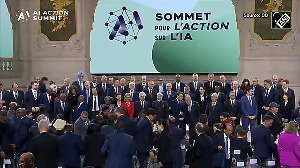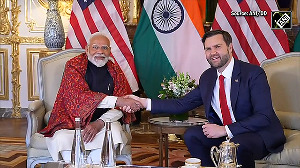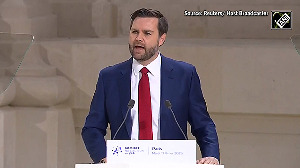Several developing countries, including India, are expected to challenge the proposals of the latest draft text on Doha market opening for industrials on Monday, at a newly created informal group under the auspices of the US.
Already, four sessions of the new G-12 countries, including the US, the EU, India, Brazil, China, among others, have taken place over the last 10 days at the American mission here. But little progress has been made on the contentious issues in the latest non-agricultural market access draft text, senior officials told Business Standard.
Last week, an informal ministerial meeting in Paris failed to arrive at a procedural roadmap on when to finalise the modalities (parameters) in the Doha agriculture and industrial goods due to mounting differences over bigger commitments being sought from the developing countries in industrial goods.
World Trade Organisation Chief Pascal Lamy lobbied hard for getting a green signal to convene a ministerial meeting by the end of this month, said one senior official. "But the Paris meeting did not provide any comfort to Lamy because of sharp differences over the level of ambition arising from the latest drafts on agriculture and NAMA," the official said.
EU trade commissioner Peter Mandelson told reporters in Paris that the NAMA talks in Geneva from Monday would be a "litmus test" for an outcome in modalities, suggesting that if there is no agreement the negotiations would fail.
While some developing countries, such as Brazil and South Africa, argue that the controversial chair for Doha NAMA negotiations, Ambassador Don Stephenson, had included some of their proposals, they reckon the text is flawed with regard to the ranges of cuts it had proposed in the Swiss formula.
But Brazil is prepared to accept a low coefficient of 19 among the NAMA-11 coalition of developing countries if it secures adequate flexibilities, which is not acceptable to other members such as India, Argentina, and South Africa.
The three countries, however, maintain that the draft text simply did not incorporate their proposals on the principle of less-than-full reciprocity. They suggested any number they agree from the chair's proposals of three ranges 19-21, 21-23 and 23-26 -- in the Swiss formula would result in much higher cuts than what industrialised countries will undertake between their coefficient range between 7 and 9.
Unlike the percentage cuts as agreed in the Doha agricultural market access, the industrialised countries managed to secure the complex Swiss formula which obfuscates the actual degree of cut in percentage terms.
Though the Swiss formula envisages that a smaller coefficient would result in a higher cut, in reality, it results in much bigger cuts for developing countries because of their higher tariff bindings.
While industrialised countries have average tariffs around 7 per cent with peak tariffs in textiles, leather and fish products and around 30 per cent in some cases, the developing countries have bound tariffs well over 30 per cent with some high tariffs in the auto sector.
Due to the latest proposals, India would face a situation where its bound tariffs for some industrial products dropping below its current applied rate of about 10 per cent at a coefficient of 19 in the Swiss formula after the Doha Round.
In percentage terms, a reduction based on a coefficient of 19 will result in a drop as high as 70 per cent, while the US even at a coefficient of 7 would witness that its tariffs will drop by around 30 per cent.
Similarly, a coefficient of 21 would also result in a steep fall of over 60 per cent for India in the final bound rates bringing tariffs in some cases below the current applied rate, while the situation is marginally better at the coefficient of 23.
In a controversial step, the chair brought a linkage between the coefficients and the flexibilities which was not there in the July 2004 framework agreement which maintained that in addition to the formula-based tariff cut, the developing countries can reduce either 10 per cent of their tariffs at 50 per cent of the formula cut, or 5 per cent of their tariffs with zero cut.
India and Argentina maintain they cannot agree to a coefficient that would result in higher cut than the industrialised countries as it would undermine the principle of less-than-full reciprocity, under which the industrialised nations must undertake higher cut than the developing countries.
More importantly, India and Argentina challenged the chair's proposals on the issue of comparability in the level of ambition in market access between agriculture and industrial products. Under paragraph 24 of the Hong Kong Ministerial Declaration of 2005, the final cuts in market access for both agriculture and NAMA must be proportional for industrialised and developing countries.
However, the paragraph 24 is now given a short shrift as industrialised countries can take a 54 per cent cut on average for agricultural products with a host of flexibilities, while developing countries will have to accept a cut well over 60 per cent cuts in industrial products with limited flexibilities, Argentina's negotiator Nestor Stancanelli told Business Standard.
Besides, the US and the EU are able to protect their textile, leather and fish tariffs through the so-called exception for preferences arrangement, Malaysia complained suggesting there is "reverse special and differential treatment for industrialised countries" in the NAMA text.
Further, while developing countries are forced to bring their industrial tariffs from bound levels to below the applied rates, the US is provided to keep its trade distorting farm subsidies well over 100 per cent above its current applied level of $7 billion.
Against this backdrop, the Doha negotiations are drowned in a sea of problems because of blatant omissions and commissions created by the chair for NAMA negotiations who decided issues not through a multilateral process but based on his personal judgment, said several trade envoys.







 © 2025
© 2025